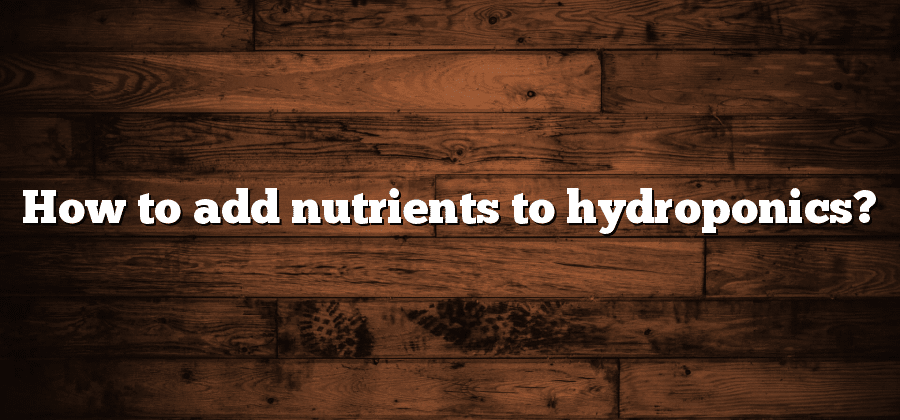Nutrient Requirements for Hydroponics
Hydroponics is a method of growing plants without soil, relying solely on nutrient-rich water solutions to meet the plants’ nutritional needs. In order for hydroponic plants to thrive, it is crucial to understand their specific nutrient requirements. Each plant has its own unique set of nutritional needs, and providing the correct balance of nutrients is essential for healthy growth and maximum yield.
The primary macronutrients required for hydroponic plants are nitrogen, phosphorus, and potassium, commonly referred to as NPK. Nitrogen is crucial for the development of leafy green growth, while phosphorus is important for root development and flowering. Potassium, on the other hand, promotes overall plant health, improving disease resistance and nutrient uptake. In addition to these macronutrients, hydroponic plants also require secondary macronutrients such as calcium, magnesium, and sulfur, as well as micronutrients like iron, manganese, and zinc. Achieving the correct balance of all these nutrients is key to optimizing plant growth and ensuring healthy and productive hydroponic systems.
Types of Nutrients for Hydroponics
There are three main types of nutrients used in hydroponics systems: macronutrients, micronutrients, and supplements. Macronutrients are the primary elements needed in larger quantities for plant growth and include nitrogen, phosphorus, and potassium. These macronutrients play crucial roles in various plant functions, such as photosynthesis, energy production, and root development. Additionally, micronutrients are required in smaller amounts but are equally important for overall plant health. These include essential elements like iron, manganese, zinc, and copper, which are involved in enzyme production, chlorophyll synthesis, and other vital biochemical processes.
Supplements, on the other hand, are optional additives that can enhance plant growth and performance in specific circumstances. These can include beneficial bacteria or fungi, amino acids, hormones, and growth regulators. While not necessary for basic plant nutrition, supplements can aid in root development, disease resistance, and overall plant vigor. It is essential to select the right nutrients and supplements for your specific hydroponic system and plant requirements to achieve optimal growth and yield.
Understanding Nutrient Solutions
The success of a hydroponic system largely depends on providing the plants with the right balance of nutrients. Understanding nutrient solutions is crucial for ensuring optimal plant growth and yield. A nutrient solution is a combination of water and essential nutrients that are provided to the plants in a hydroponic system. These nutrients are dissolved in water and delivered directly to the plant roots, bypassing the need for soil.
A well-formulated nutrient solution should contain a balanced ratio of macronutrients and micronutrients. Macronutrients are the primary elements required in large quantities by plants, including nitrogen (N), phosphorus (P), and potassium (K). These macronutrients are crucial for plant growth, development, and overall health. On the other hand, micronutrients are essential elements required in smaller quantities, such as iron (Fe), manganese (Mn), and zinc (Zn), among others. These micronutrients play vital roles in various plant metabolic functions and are necessary for preventing nutrient deficiencies. By understanding the importance of both macronutrients and micronutrients, hydroponic growers can create nutrient solutions that meet the precise needs of their plants, promoting healthy growth and high yields.
Balancing Nutrient Levels in Hydroponics
In hydroponics, balancing nutrient levels is crucial for the successful growth of plants. Nutrients are essential for providing the necessary elements for plant development, and maintaining the right balance ensures optimal health and productivity. However, achieving this balance can be challenging, as it requires careful monitoring and adjustment of nutrient levels to avoid deficiencies or toxicities.
To effectively balance nutrient levels in hydroponics, it is essential to understand the specific needs of the plants being grown. Different plants have varying nutrient requirements, and it is important to tailor the nutrient solution accordingly. Conducting regular water and soil tests can provide valuable insights into the nutrient composition and pH levels, allowing growers to make informed decisions regarding the nutrient mix.
Maintaining the correct nutrient balance also involves considering other factors that can impact nutrient uptake, such as temperature, lighting, humidity, and pH levels. These environmental factors can influence the availability and absorption of nutrients by the plant roots. It is crucial to create an optimal environment for plant growth by ensuring appropriate temperature and humidity levels, providing adequate lighting, and adjusting the pH of the nutrient solution to the desired range.
Achieving a balanced nutrient solution in hydroponics requires careful attention to detail and regular monitoring. Growers must be diligent in adjusting nutrient levels as necessary, taking into account the specific needs of the plants and environmental conditions. By maintaining a nutrient solution that is tailored to the plants’ requirements, growers can ensure healthy and vigorous growth, resulting in bountiful harvests.
Choosing the Right Fertilizer for Hydroponics
When it comes to choosing the right fertilizer for hydroponics, there are several factors to consider. The first step is to understand the nutrient requirements of the plants you are growing. Different types of plants have different nutrient needs, so it is important to research and identify the specific requirements for your chosen crop.
Once you have determined the nutrient requirements, you can consider the various types of fertilizers available for hydroponics. There are two main types: liquid fertilizers and powdered fertilizers. Liquid fertilizers are typically easier to use and provide nutrients directly to the plant’s roots. Powdered fertilizers, on the other hand, need to be dissolved in water before they can be used. It is essential to choose a fertilizer that is designed specifically for hydroponics, as conventional fertilizers may not have the necessary balance of nutrients for optimal plant growth.






